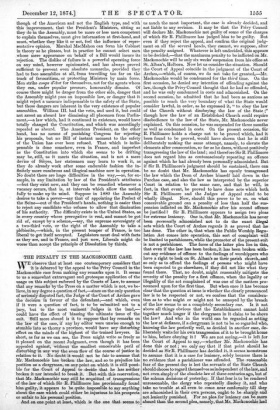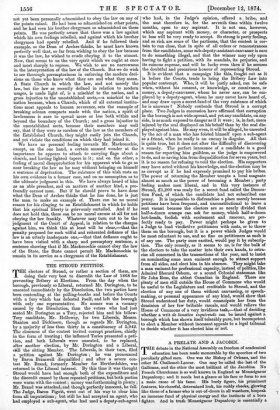THE PENALTY IN THE MACKONOCHIE CASE.
observe that at least one contemporary considers that
it is debarred by the appeal to the Privy Council in the Mackonochie case from making any remarks upon it. It seems to us a somewhat extravagant and grotesque application of the usage on this subject enforced by the Courts of Law, to assume that any remarks by the Press on a matter which is not, we be- lieve, in any degree a question of fact,‚ÄĒsince on the only question of seriously disputed fact,the Judge of the Court of Arches gave the decision in favour of the defendant,‚ÄĒand which, even if it were a question of fact, is to be submitted not to a jury, but to the most eminent Judges in the land,‚ÄĒ could have the effect of biassing the ultimate issue of the suit. ' Still more absurd is it to suppose that lay remarks on the law of the case, if any lay editor were unwise enough to stumble into so thorny a province, would have any disturbing effect on the minds of the highest of the trained lawyers. In short, as far as we can see, the Press might write as freely as it pleased on the recent Judgment, even though it has been appealed against, without the smallest conceivable peril of disturbing in any way the even flow of the course of justice in relation to it. No doubt it would not be fair to assume that Mr. Mackonochie has broken the law, and so to prejudice his position as a clergyman, on any point on which it is still possi- ble for the Court of Appeal to decide that he has neither broken it nor intended to break it. But with this reservation, that Mr. Mackonochie may still be acquitted of transgressions of the law of which Sir It Phillimore has provisionally found him guilty, it appears to be quite impossible to say anything about the case which could either be injurious to his prospects or unfair to his personal position.
And on one point at least, which is the one that seems to
us much the most important, the case is already decided, and not liable to any revision. It may be that the Privy Council will declare Mr. Mackonochie not guilty of some of the charges of which Sir R. Phillimore has judged him to be guilty. But even if they reject the appeal, and confirm the original judg- ment on all the several heads, they cannot, we suppose, alter the penalty assigned. Whatever is left undecided, this appears to be decided,‚ÄĒthat the maximum penalty to be inffioted on Mr. Mackonochie will be only six weeks' suspension from his office at St. Alban's, Holborn. Now let us consider the situation. Should the Court of Appeal coincide in the judgment of the Court of Arches,‚ÄĒwhich, of course, we do not take for granted,‚ÄĒMr. Mackonochie would be condemned for the third time. On the first occasion, he denied any intention of offending against the law, though the Privy Council thought that he had so offended, and he was only condemned in costs and admonished. On the second occasion, he admitted that he had been as anxious as possible to reach the very boundary of what the State would consider lawful, in order, as he expressed it, "to obey the law of the Church without disobeying the law of the State f though how the law of an Established Church could require disobedience to the law of the State, Mr. Mackonochie never explained. On this occasion, he was suspended for three months as well as condemned in costs. On the present occasion, Sir R. Phillimore holds a charge not to be proved which, had it been found to be proved, would have shown that he is still deliberately making the same attempt, namely, to elevate the elements after consecration, so far as he dares, without positively transgressing the law -of the land; and therefore Sir R. Phillimore does not regard him as contumaciously repeating an offence against which he had already been personally admonished. But if Sir R. Phillimore's judgment should be sustained, there can be no doubt that Mr. Mackonochie has openly transgressed the law which the Dean of Arches himself laid down in the Purchas case, and also the law as interpreted by the superior Court in relation to the same case, and that he will, in feet, in that event, be proved to have done acts which both Sir R. Phillimore and the Judges of Appeal ruled to be wholly illegal. Now, should this prove to be so, on what conceivable ground can a penalty of less than half the sus- pension inflicted on Mr. Mackonochie after his second offence be-justified ? Sir R. Phillimore appears to assign two pleas for extreme leniency. One is, that Mr. Mackonochie has never been personally .admonished not to do the exact illegal acts which the Court -of Arches regards it as proved that he has done. The other is, that when the Public Worship Regu- lation Act comes into operation, this sort of complaint will be limited to parishioners, while the promoter of the present suit is not a parishioner. The force of the latter plea lies in this, that even if the law has been broken, it has been broken with- out any evidence of offence to the feelings of worshippers who have a right to look on St. Alban's as their parish church,.and so only as to offend the feelings of persons who might have been expected to go elsewhere, if they did not like what they found there. That, no doubt, might reasonably mitigate the severity of the penalty for a first offence, when the legality or illegality of the act complained of was one of the matters pro- nounced upon for the first time. But when once it has become clear that the question, at issue is whether the dearly pronounced law is to be respected or not, we confess that the considera- tion as to who might or might not be annoyed by the breach of the law seems to us a completely secondary one. Is it not above all things obvious that the Establishment cannot hold together much longer if the clergymen in it claim to be above the law? And who in the world can be regarded as setting the law at defiance, if a clergyman is not to be so regarded who, knowing the law perfectly well, as decided in another case, de- liberately waits for his own trangression of it to be brought home to him, before obeying it ? We are not saying,‚ÄĒit is left for the Court of Appeal to say,‚ÄĒwhether Mr. Mackonochie has done this or not ; we only say that if that point should be decided as Sir B. Phillimore has decided it, it seems -monstrous to assume that it is a case for leniency, solely because there is no evidence that a parishioner was offended. The reasonable fear of the present day is lest the servants of the State Church should choose to regard themselves as independent of the law, and not even simply of the obsolete law of three centuries ago, but of the solemn decisions of yesterday. If that fear is to be rendered unreasonable, the clergy who repeatedly disobey it, and who take no trouble at all even to come near conformity till they are admonished in their own persons, ought to be sharply and not leniently punished. For no plea for leniency can be more absurd than the second plea, namely, that Mr. Mackonochie had not yet been personally admonished to obey the law on any of the points raised. He had been so admonished on other points, and he had seen his brother clergymen so admonished on these points. He was perfectly aware that there was a law against which his own feelings rebelled, and against which his brother clergymen had openly rebelled. And if he followed their example, as the Dean of Arches thinks, he must have known perfectly well that, so far from wishing to obey the law because it was the law, he wished to evade obeying it to the utmost. Now, that seems to us the very spirit which we ought at once and most sharply to repress. We wish to see no narrowness in the interpretation of the law of the Church. But we do wish to see thorough peremptoriness in enforcing the modern deci- sions on those who know what they are and what they mean. A State Church in which the law, and not merely the law, but the law as recently defined in relation to modern usages, is made light of, is a mischief to the nation, and a gross injustice to the unestablished sects,‚ÄĒa mischief to the nation because, when a Church, which of all external institu- tions most appeals to human reverence, sets the example of breaking solemn compacts made with the nation, a spirit of lawlessness is sure to spread more or less both within and beyond the boundary of the Church ; and a gross injustice to the unestablished sects, because their members may well say, that if they were as careless of the law as the members of the Established Church, they might easily join the Church, and yet violate the conditions on which they had joined it.
We have no personal feeling towards Mr. Mackonochie, except, on the one hand, a certain amused wonder at the importance he appears to attach to carrying flags about a church, and having lighted tapers in it ; and on the other, a feeling of moral disapprobation for his apparent wish to go as near breaking the law as he may without bringing on himself a sentence of deprivation. The existence of this wish rests on his own evidence in a former case, and on no assumption as to the ultimate judgment in this. We have always heard of him as an able preacher, and on matters of another kind, a pro- foundly earnest man. But if he should prove to have done what the Dean of Arches thinks that he has done, he is just the man to make an example of. There can be no moral reason for his clinging to an Establishment in which he holds that his spiritual liberty is grievously curtailed. And if he does not hold this, there can be no moral excuse at all for not obeying the law frankly. Whatever may turn out to be the judgment of the Court of Appeal, in relation to the charges against him, we think this at least will be clear,‚ÄĒthat the penalty proposed for such wilful and reiterated defiance of the law is an utterly inadequate one,‚ÄĒthat that defiance ought to have been visited with a sharp and peremptory sentence, a sentence showing that if Mr. M.ackonochie cannot obey the law of the State, the State cannot permit Mr. Mackonochie to remain in its service as a clergyman of the Establishment.







































 Previous page
Previous page